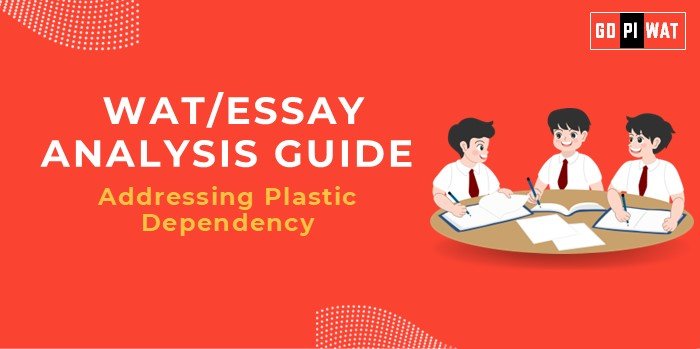📋 WRITTEN ABILITY TEST (WAT)/ESSAY ANALYSIS GUIDE: Addressing Plastic Dependency
🌍 Understanding the Topic’s Importance
Plastic dependency intertwines with sustainability, economics, and public policy. For B-schools, the topic bridges strategy, innovation, and corporate social responsibility, all key to modern business education.
📝 Effective Planning and Writing
- Time Allocation (30 minutes):
- Planning: 5 minutes
- Writing: 20 minutes
- Review: 5 minutes
- Preparation Tips:
- Research successful policies and statistics.
- Note examples of alternative solutions.
💡 Introduction Techniques for Essays
- Contrast Approach: “While plastic revolutionized industries, it also led to one of the most pressing environmental challenges of our time.”
- Solution-Based Approach: “Biodegradable plastics and zero-waste economies promise a sustainable future, but the path is fraught with challenges.”
📚 Structuring the Essay Body
- Achievements:
- “127 countries have implemented laws to regulate plastic. The EU’s strict measures aim for 55% recycling by 2025, showing significant progress.”
- Challenges:
- “Only 9% of plastic waste is recycled globally, underscoring the limitations of current systems.”
- Future Outlook:
- “Bioplastics are projected to replace 30% of conventional plastics by 2030. Governments must integrate waste management innovations.”
✅ Concluding Effectively
- Balanced Perspective: “Plastic reduction requires coordinated global efforts blending innovation, legislation, and consumer action.”
- Global Comparison Approach: “With countries like Japan achieving 90% PET recycling, the world has models to emulate.”
📈 Analyzing Successes and Shortcomings
- Achievements: Policies, corporate pledges, emerging alternatives.
- Challenges: Cost barriers, lack of scalable solutions.
- Global Context: Learning from EU and Japan’s recycling success.
🌟 Recommendations for Sustainable Progress
- Encourage public-private partnerships to drive innovation and scale alternatives.
- Foster consumer awareness through education and incentives to promote behavioral changes.
- Introduce policy innovations, such as circular economy models for waste reduction.
✍️ Sample Short Essays
1. Balanced Perspective:
“Plastic is both a boon and bane of modern life. Addressing this paradox requires embracing innovation, stringent policies, and a cultural shift toward sustainability.”
2. Solution-Oriented:
“Bioplastics, recycling, and behavioral change form the triad of solutions to the plastic crisis. Accelerated adoption can transform global dependency into resilience.”
3. Global Comparison:
“As Japan leads with high recycling rates and the EU sets ambitious targets, the world must replicate and scale such efforts to mitigate plastic dependency.”


